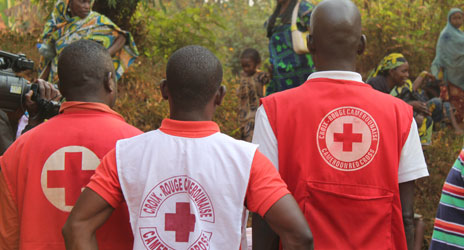
COVID-19 in Africa. ICRC regional director declares "We are racing to slow the spread of the pandemic”
The ICRC incoming regional director for Africa, Patrick Youssef explains the situation of COVID-19 in Africa and the consequences that could come out, now that the invisible threat of coronavirus is looming in the conflict zones in Africa where the International Committee of the Red Cross works.
Africa has always seemed so far from anything else, and even in this pandemic, it has been the last continent affected by the virus. However, if the measures to contain the COVID-19 in Africa are not taken immediately, it could be devastating for Africa’s people and health-care systems.
While the whole world is struggling against the coronavirus, many African countries have closed their borders and introduced curfews and confinement rules. We do not yet know the full extent of the economic and social crisis after this pandemic, even if the first problem to solve is the health one, without doubts. Despite the unstable health situation, wars and fighting, such as in the Lake Chad Region, are continuing.
Humanitarian aid in times of COVID-19. Even more critical
Burkina Faso is the most hit region this far. Each passing day, Red Cross crews registered a continuing spread of the of COVID-19 in both the rural and urban area. In places like Djibo, the population do not have much clean water and soap and with the movement of people of other villages fleeing there because of conflicts make very difficult the social distancing.
Another problem which will make difficult to fight the coronavirus is the destruction of most of the health facilities in the African regions. Proof that hospitals, ambulances and medical personnel all too often become targets in armed conflict.
In developing countries, it’s common for a family to use more than half its income to pay for food. When an epidemic, such as Ebola, SARS or MERS, hits communities already struggling to get the food they need, they are at even greater risk of various forms of malnutrition. Without counting that some countries rely heavily on imported food to feed their populations, making any disruption in the supply chain perilous.
ICRC declared: we can’t let our guard down
Patrick declared that ICRC introduced protocols to protect its teams’ health and allow them to continue their humanitarian work. All non-essential travel has been cancelled. Some staff members are working tirelessly from home to ensure continuity. Others, who have come from countries more acutely affected by the virus, have been put in preventive quarantine to protect their health and that of their neighbours.
The environments where Red Cross teams work is already unpredictable and unstable. Plus, since many governments stopped travels of any type, it jeopardizes our ability to get our staff and our humanitarian aid where they are needed.
The idea of the ICRS, as declared by Patrick, is to create a platform for exchanging information with governments, organizations and research institutes in Africa. People like Red Cross humanitarians, who face a crisis in conflict zones, must, now more than ever, be given the space to do their neutral and impartial work, to take preventive measures so that this pandemic does not reach the places that simply cannot cope.


